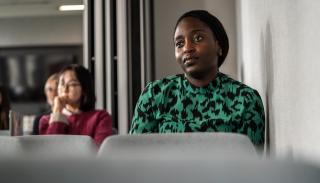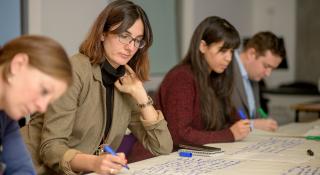
Breadcrumbs navigation
Student voices - PhD applications and funding in the UK
In the first of a series of PhD student interviews and blogs, we look at why five students chose to study in the UK, how they found a supervisor, what funding they secured, and what they wish they’d known before they started their studies.
Contributors
- Sabrina Ahmed - University of East Anglia
- Christopher Choong Weng Wai – University of Warwick
- Ndidi Olibamoyo - University of Bath
- Shivani Singh - Aberystwyth University
- Chester Yacub - University of Nottingham
What is/was the topic of your PhD?
Sabrina: My PhD thesis is looking at the impact of security policies on the Rohingya refugee community in Bangladesh. Coming from a humanitarian aid worker background and now being an academic in critical security studies, one of the key objectives of my research is to understand vernacular security- the non-elite experience of security within the refugee community in the camps. One of the key gaps in the critical security scholarship is a lack of empirical research, especially coming from the global South countries on the experiences of those who are impacted by states’ security and domestic counterterrorism policies. As such, my research will contribute to contemporary work within this literature (i) empirically – through vernacular security research into an underexplored case study; (ii) analytically – through centring the experiences of non-Western subjects of security policy; and (iii) theoretically – through re-theorising security policy and its implications.
Christopher: Broadly, my thesis revolves around the question of how the international (colonial/imperial capitalist world-system) and everyday interact in reproducing racial/gender capitalism in Malaysia. I am interested to bring feminist perspectives to understand (and complicate) racial capitalist discourses, particularly centering the gendered political economy of social reproduction.
Ndidi: Global Politics of Cyberspace: The Nature of African Agency in International Cyber Norms Processes
Shivani: My thesis undertakes a historical comparative mapping of China, India and Pakistan in explaining the behaviour rising/peripheral nuclear states in the global nuclear order. I adopt the lens of ‘accommodation demands’ to examine the patterns/trends in interactions of each of these three states with the institutions of the nuclear order.
Chester: My research explored maritime incidents occurring in the South China Sea between 1995 and 2022, specifically focusing on how perceived existential threats have influenced Philippine policy discourses, leading to their securitization. Utilising process tracing, the project delved into one pivotal case – the alleged ramming, sinking, and abandonment of a Philippine fishing vessel near the Reed Bank in 2019. In this incident, the Philippine response deviated from the norm by favouring China, opting to “de-securitise” the issue. The thesis argued that underlying patron-client relationships among various actors facilitated a mechanism rooted in the Copenhagen School’s Securitisation Theory. This framework highlighted the interplay between external and local political actors and structures, which shaped the foreign policy decisions of the Philippine government in response to such critical maritime incidents. By unpacking the dynamics of this “unfortunate maritime incident”, my research shed light on the intricate web of influences that guide state actions and responses in the region.
Why did you decide to pursue a PhD specifically in the UK?
Shivani: The UK higher education institutions are known for their high-quality research and rigour of methodology. Aberystwyth University in particular, houses a world-renowned International Politics department which aligned perfectly with my research interests. I was also offered a full scholarship to pursue my PhD which was a huge assistance. In the UK, I have been able to find brilliant minds in my field who have helped me tremendously, along with long-lasting friendships and exposure to different cultures and identities.
Ndidi: When it became clear that my research area was interdisciplinary, it was difficult to locate experts within that field in my home country. This was because studies on the global politics of cyberspace was still really recent and emerging. From my literature search, I discovered that a number of scholars whose publications informed my research were in the UK, so I decided to send my proposals to them and submitted my applications to their institution.
Sabrina: I think I can express my candid perspectives for once. England, given the backdrop of Brexit, did not feature glaringly in my considerations. Since I did my MS in the UK back in 2017, I was aware of the increasing anti-immigrant, anti-brown and anti-Muslim sentiments and I was not a huge fan of it. However, the main reason for coming to the UK was my supervisor who is based here and I wanted to do my research under his guidance. A lot of times I am also asked why have I chosen the university where I am based now, that is the same reason as well. I came here for my supervisor, I did not know much about this university.
Christopher: I was already in the UK doing a residential fellowship in 2020/21, when I was contemplating a PhD. It was right in the midst of the COVID-19 pandemic, so transitioning to a PhD in the UK seemed like a logical route. But other than practical considerations, I also liked the fact that a PhD project in the UK is not tied to supervisors’ funding nor a specific research programme. I felt that it could give me more room to develop my research proposal/ideas. Moreover, my encounters with critical, heterodox spaces in the UK universities have resonated with my own intellectual convictions (although that space is also shrinking as we now see with the suppression of academic freedom on the Palestine question).
Chester: Securing funding played a pivotal role in my decision to pursue a PhD in the UK. When contemplating my academic trajectory, I initially recognised the financial constraints associated with advanced studies. Fortunately, I was awarded funding for my master’s degree at the London School of Economics and Political Science (LSE) in 2017-2018, which facilitated my education and acquainted me with the UK's academic landscape and research culture. Building upon this foundation, pursuing a PhD within the British system seemed like a logical progression. The availability of funding opportunities, both from institutional sources and external scholarships, alleviated financial concerns and ensured that I could dedicate myself fully to my research without undue financial strain.
Moreover, the UK’s reputation for academic excellence and its vibrant research community were compelling factors in my decision. The opportunity to engage with leading scholars, access state-of-the-art facilities, and participate in interdisciplinary collaborations were all enticing prospects that further solidified my choice. In essence, while funding initially drove my decision to pursue a PhD in the UK, the rich academic environment, coupled with ample opportunities for intellectual growth and professional development, affirmed the suitability of this path for advancing my scholarly pursuits.
"the UK’s reputation for academic excellence and its vibrant research community were compelling factors in my decision. The opportunity to engage with leading scholars, access state-of-the-art facilities, and participate in interdisciplinary collaborations were all enticing prospects that further solidified my choice."

How did you go about finding a supervisor for your project? Was this a difficult process?
Shivani: The strategy that worked best for me was reaching out to the faculty in different universities who work on the same issue areas by establishing correspondence over email. The majority of professors were very responsive and welcoming in engaging with me on my potential research project, and helped me develop the project further. Besides, prior contact with potential supervisors can help in conveying the applicant’s eagerness and dedication that can be a positive determining factor in the final decision on the university application.
Christopher: I was developing my MSc dissertation proposal at the time (as part of the residential fellowship), so I customised it as something that can be extended into a PhD and used it as a basis to write to potential supervisors. I reached out to supervisors whom I thought have the expertise and interest in the topic (tip: beyond publications and stated research interests, looking at their past/present PhD projects under supervision helps to give a sense as well). A supervisor’s familiarity with the geographical context of the research was an added advantage for me. In retrospect, the process was not so much difficult than unsettling, especially when there was no reply at all (in some cases)—in fact, to be rejected felt oddly better because one could close that door and move on to other options. But I was also lucky I did not have to go through this unsettling process for too long before I found a supervisor.
Chester: It took six months from our initial contact for my supervisor to green-light my university application. Throughout this period, our correspondence evolved into what I now recognize as a precursor to the supervision sessions I would later have during my doctoral studies. Feedback exchanges via email, spanning at least four iterations, became invaluable preparatory steps for what lay ahead.
Reflecting on my experience, I’ve distilled two key strategies for future seekers of PhD supervisors. Firstly, align your research proposal closely with the interests and expertise of potential supervisors, gleaned from their personal or university websites and their published works. Secondly, invest the effort to truly understand your own passions and commit to a topic that will sustain your interest over the years of doctoral study. After all, your thesis will serve as the foundation for future academic pursuits, whether in post-doctoral research or university teaching. In my case, embracing the latter approach proved to be immensely rewarding.
Ndidi: My current supervisor had a lot of citations within the Cyber Diplomacy literature. I checked his Institutional profile and saw that he was accepting new doctoral students. This encouraged me to send my application to the University of Bath and within a month, remote interview was scheduled.
Sabrina: Finding a PhD supervisor is definitely a difficult process. I recall reaching out to approximately 23 professors with my PhD proposals. While some responded positively and expressed interest in supervising me, none had funding opportunities available. The interesting thing is I never approached my main supervisor as I thought he would not reply to my email. I had doubts that someone with such an extensive publication record would even read my email, let alone consider supervising me. Additionally, I assumed that a distinguished academic of such height might not be interested in supervising a PhD student who is primarily a practitioner without any academic publication. But then right before giving up, I sent an email with my PhD proposal.
To my surprise, I received a response within a week, with an apology for the perceived delay. The reply also expressed appreciation for my proposal and encouraged me to promptly submit my application through the University's official website. Moreover, he thoughtfully alerted me about a scholarship opportunity with a deadline approaching in a week or so. In a gesture of generosity, he also introduced me to a potential secondary supervisor whose valuable guidance assisted me in swiftly preparing my scholarship application. I remember that week became a whirlwind of activities and excitement during a monotonous pandemic-wrecked work-from-home period. I found myself revising my proposal, completing the university application, and applying for the scholarship, all within the constraints of time.
Did you/Do you receive any financial support or funding for your PhD? How did you go about finding funding sources to apply for? And how was the application process?
Christopher: I am currently a recipient of the Chancellor’s International Scholarship (CIS). The Doctoral College in Warwick publishes (and updates) a list of scholarship opportunities, a tremendous resource for prospective PhDs looking for funding (I found out about CIS through the list). The CIS application is synchronised with the course application, so the application process is quite straightforward. But I have learned the importance of answering scholarship application questions with more specific examples (not give generic answers); drawing out strengths of the research proposal in relation to the university/department’s research priorities; and demonstrating that the research is feasible (in terms of duration, resources, and capacities).
Sabrina: Yes, with extensive support from both my primary and secondary supervisors, I was able to secure the South East Network for Social Science (SeNSS) scholarship. I am in the Politics and International Relations pathway. I owe a debt of appreciation to SeNSS for providing me with numerous opportunities to participate in conferences and summer schools relevant to my field of study. These experiences have significantly enriched my academic skills and expertise. To my knowledge, I am the first student from Bangladesh to have received this scholarship.
Other potential scholarships for international students to pursue PhD in the UK can be: The Consortium for the Humanities and the Arts South-East England (CHASE) and the Commonwealth scholarship.
Shivani: I was the recipient of Aberystwyth University’s internal funding-Aber Doc and President’s scholarship which took care of my tuition fee, the difference in national and foreign tuition fee, monthly stipend and travel grant for conferences. Apart from this, other useful funding sources include-ESRC scholarships, Commonwealth scholarship (for Indian students) and Inlaks foundation scholarship (for Indian students), amongst others.
"it is crucial to mentally prepare oneself for the possibility of not being able to see loved ones frequently, unless one possesses significant wealth to afford frequent flights home."
What do you wish you had known during the application process, or before starting your PhD?
Ndidi: While I was optimistic about my status as a self-funded international student (although I was intensely scouting for funding), I did not realise that the constantly rising cost of living would greatly impact my ability to finance my doctoral studies. If I could go back, I will probably consider Institutions with funded programmes. I must state though that my supervisors did mention that funding for my area of research for international students in the UK was scarce, but I did not want that to hinder my desire to commence my research at that time.
Christopher: It is good to keep in mind that application costs for PhD students from abroad can be quite exorbitant, especially if you are bringing your family along (visa application fees, payment for English language test, immigration health surcharge, proof that you have enough money for living expenses, etc). These costs are usually not covered by your PhD funding/scholarships. Navigating the private rental market can also be a steep learning curve if are not familiar with the system, with upfront costs like tenancy deposit, holding deposit, advanced rent, and so on.
Sabrina: My words may seem bleak, but I want to convey the reality of my situation. If only I had foreseen the urgent need to return home and my father's tragic accident. If only I had known that a critical moment for my family would coincide with my PhD journey, leaving me consumed with guilt for being away. For those who serve as caregivers for their parents, the decision to pursue higher education abroad is challenging, especially in the face of daunting visa processes, such as in the UK. The financial strain of frequent travel back home, with the steep costs of both distance and airfare, weighs heavily. I wish I had considered these factors before embarking on my PhD journey. Back home, I had a stable professional career where I could afford everything my family and I needed. Now, reliant on my scholarship, the majority of which goes towards rent in England, my circumstances have drastically changed.
So, this is something I would recommend, particularly those from a practitioner background, to carefully consider the implications before resigning from their jobs to pursue a PhD, especially in the UK where inflation adds to the daily challenges. While it is impossible to predict the future with certainty, it is crucial to mentally prepare oneself for the possibility of not being able to see loved ones frequently, unless one possesses significant wealth to afford frequent flights home.
Shivani: It would have been helpful to have a ‘one-stop-shop’ guidance on professional development throughout the PhD experience. This is useful in building the right profile for job applications later on.
Chester: Firstly, I wish I had fully understood the holistic nature of the PhD experience beyond simply obtaining a degree. While the end goal is undoubtedly important, the journey itself is filled with challenges that require not only hard work but also patience and self-compassion. In particular, I underestimated the psychological and emotional toll that doctoral studies can exact, especially amidst the backdrop of a global pandemic.
Secondly, I attribute much of my success in my PhD journey to my supervisors' invaluable guidance and support. While I have heard of fellow students encountering difficulties with their supervisors, I was fortunate to have a positive experience with mine. Having two supervisors, each with complementary expertise and perspectives, enriched my research approach. Their collaborative supervision provided me with diverse insights and approaches to my topic, ultimately enhancing the depth and breadth of my work. Additionally, opportunities to work closely with my primary supervisor, such as serving as a research assistant and co-authoring publications, further enriched my academic experience and prepared me for future pursuits. Here are the links to some of my work with my primary supervisor: https://www.tandfonline.com/doi/full/10.1080/01436597.2023.2218807, https://www.nottingham.ac.uk/asiaresearch/news/2022/new-asia-dialogue-podcast-episode.aspx, and https://www.newmandala.org/author/chesteryacub/. In hindsight, I realise the critical importance of selecting the right supervisors who possess relevant expertise and align with your working style and academic goals. Their guidance can significantly shape the trajectory of your PhD journey and contribute to your overall success.
Third, there are funding opportunities within the university and through external research centres and organisations which facilitated my academic pursuits. These resources have alleviated financial concerns and enabled me to undertake ambitious research projects (I joined a project my supervisor led) and attend conferences and workshops that enrich my scholarly development.
Finally, while the PhD journey can sometimes feel solitary, the sense of camaraderie and connection with fellow students pursuing similar paths has been a source of immense joy and support. Through academic friendships forged within my department and through engagements with international conferences such as BISA (and ECPR, and ISA), I have found a vibrant community of scholars with whom I can share ideas, collaborate, and draw inspiration. These connections have added a rich layer of depth and meaning to my PhD experience, underscoring the value of collaboration and shared intellectual pursuits in academic life.
Stay tuned for the second part of our interviews with Sabrina, Christopher, Ndidi, Shivani and Chester. Next they discuss their experiences of moving to the UK, the biggest challenges whilst doing a PhD, and what they have most enjoyed.


